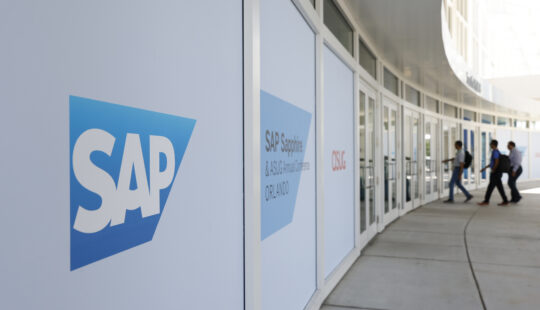Kathy Gibson reports from SAPPHIRE NOW– Becoming an intelligent enterprise allows organisations to achieve great business outcomes.
This is the message from Christian Klein, CEO of SAP, who explains that organisations can increase resilience, rise to challenges, and increase profitability.
“We can achieve sustainability by reducing waste and creating circular economies,” he told delegates to the virtual SAPPHIRE NOWconference. “We can make sustainability profitable and profitability sustainable.”
The Covid-19 pandemic has shown us how helpless we can be when something unexpected hits us, Klein adds. “Digital transformation is no longer an option, but a must. When we can’t interact in person, we have to find other ways.”
While business leaders across the world are worrying about whether their companies will survive, the more technologically advanced have a better chance of survival.
“If your business is not resilient, you have nothing,” he stresses. “After that, you need to focus on profitability.”
In the current world of coronavirus, Klein says it is more important than ever to set your company up for growth.
“New technologies enable better customer experiences. They also allow for scale, and help to secure profitability.”
While the focus right now is on health, safety and business continuity, a bigger challenge is climate change, he adds. “Just as we cannot ignore the pandemic, we cannot ignore climate change.
“Imagine the impact if all industries join the fight to reduce carbon emissions,” Klein points out. “The current situation has shown us we can quickly drive change if we want to. So let’s seize the opportunity to build resilient, profitable and sustainable businesses.
“We all care about our business success, but we are also members of our communities, and should care about the world we leave behind.
“We are in the driver’s seat,” Klein says.
Sustainability is good for business too, he adds. “This is not just about the next generation, it is about customers and employees that choose companies that care about sustainability. Companies are selected not only on their performance but on their sustainability practices.
“The business values of a profitable business are clear: resilience, profitability, sustainability.
“We can help you achieve this.”
Klein was previously the chief operating officer of SAP and was responsible for the company’s own digital and sustainability transformation.
“I learnt that transformation will only be successful if there is leadership from the top,” he says. “We have been doing this ourselves for almost 50 years, and the SAP product strategy enables us to deliver the right outcomes.
“We are an innovator and business partner. We have spent time with customers to understand requirements and challenges. As a result we have evolved our vision of the intelligent enterprise.”
SAP is helping companies improve supply chain and industry-specific processes, connect through the business network and embed sustainability as a critical measure of business success.
“In uncertain times, companies need a trusted partner to help them make confident decisions to enhance agility and resiliency during and beyond the current Covid-19 crisis,” says Thomas Saueressig, member of the executive board of SAP for SAP product engineering. “In today’s hyperconnected world, it’s even more important for businesses to quickly react to environmental and market changes.
“We’re helping to address these challenges with new ways for customers to address sustainability, lead in their industry and grow their business networks. SAP has the strategy, expertise, solutions and partner ecosystem to enable customers to run their business as an intelligent enterprise.”
Other announcements included:
Climate 21
SAP announced the Climate 21 program to support customers in pursuing their climate-related objectives.
In a multiyear road map, SAP will work with co-innovation partners to embed sustainability metrics across SAP’s solution portfolio. This will help customers understand, analyse and optimise the carbon footprint of their products and operations along the value chain.
The SAP Product Carbon Footprint Analytics application is now available as the first solution in the Climate 21 program. The application uses data from SAP S/4HANA and third-party sources and calculates this information within the SAP Analytics Cloud solution.
This helps customers understand their carbon footprint and provides a foundation for analysing and optimising greenhouse gas emissions.
Industry Cloud
Intelligent enterprises strike the balance between optimising their current business models and innovating at the vertical edge to develop new revenue streams and growth potential using digital technologies.
SAP and its partners are offering industry cloud solutions that extend the end-to-end processes of SAP’s intelligent suite to help drive customer’s core business in their industries.
SAP’s industry cloud strategy will deliver innovative, vertical solutions from SAP and its partners. These solutions will be built on technologies in the Business Technology Platform portfolio and use an open API framework, open process model, open domain model and common business services to create a better customer and user experience.
The interoperability with SAP’s intelligent suite will enable rapid development, deployment and integration.
Artificial intelligence, the Internet of Things and other advanced technologies from SAP will be available to help developers to accelerate development and deliver greater business value, enabling improved business practices and business innovation at the vertical edge.
Investment in Industry 4.0 across the supply chain
SAP innovations can help companies design and manufacture intelligent products and assets that can capture and analyse the increased tide of information from sensors across the supply chain. This enables customers to move Industry 4.0 from a factory-focused initiative to a company-wide business strategy.
With Industry 4.Now, SAP will deliver innovations that companies need to create and capture a digital thread of these intelligent products and assets throughout their lifecycle to provide real-time insights back into the business processes, from design to operations.
With embedded analytics and predictive capabilities, this intelligence can empower people to make better business decisions and drive new business models and revenue streams.
Strategy for a unified business network
SAP announced a strategy to bring end-to-end visibility, increased efficiency and collaboration across the entire supply chain processes, including design, planning, sourcing, procurement, manufacturing, logistics and asset operations.
By creating a network of intelligent enterprises, SAP can help companies digitalise multi-enterprise business processes for better visibility and collaboration across the supply chain ecosystem.
This initiative spans across SAP, using insights from real-time ERP, advanced analytics and successful networks solutions such as Ariba Network, SAP Asset Intelligence Network, SAP Logistics Business Network and SAP Fieldglass solutions to deliver the collective intelligence through an open and interoperable business network.
With more than $3,3-trillion flowing through these business-to business powerhouses, SAP will help enable sustainable and resilient supply chains, transform business models and provide the agility to safeguard against global disruptions.
This article first appeared on ChannelWise.



